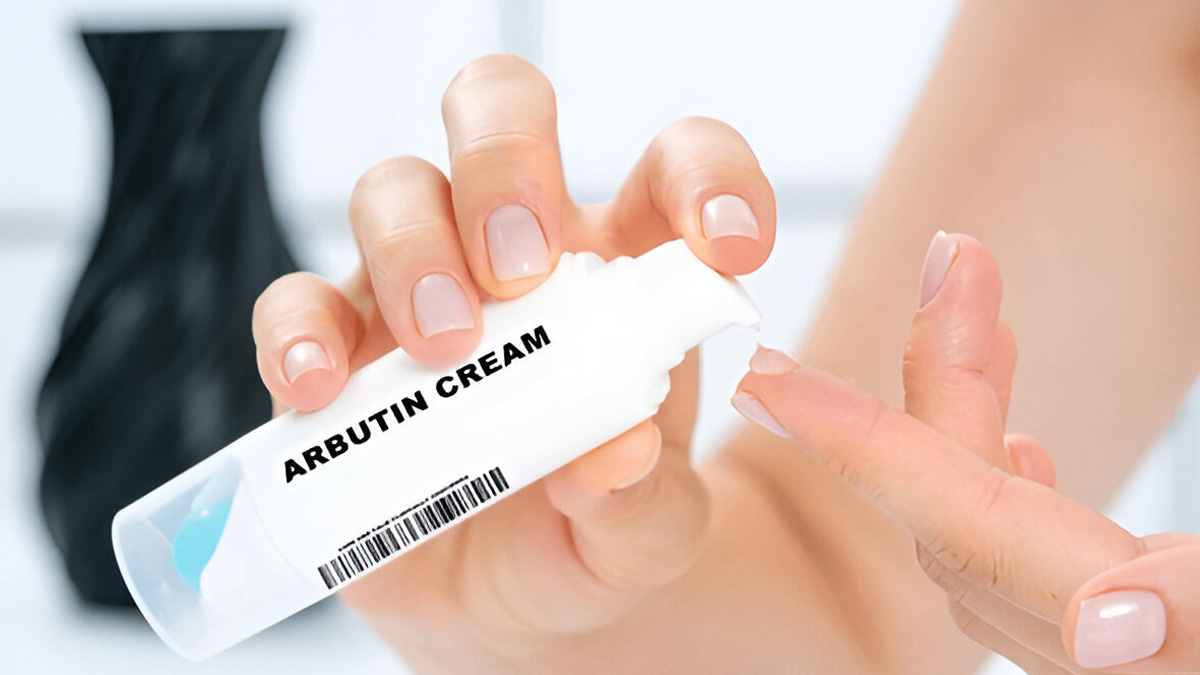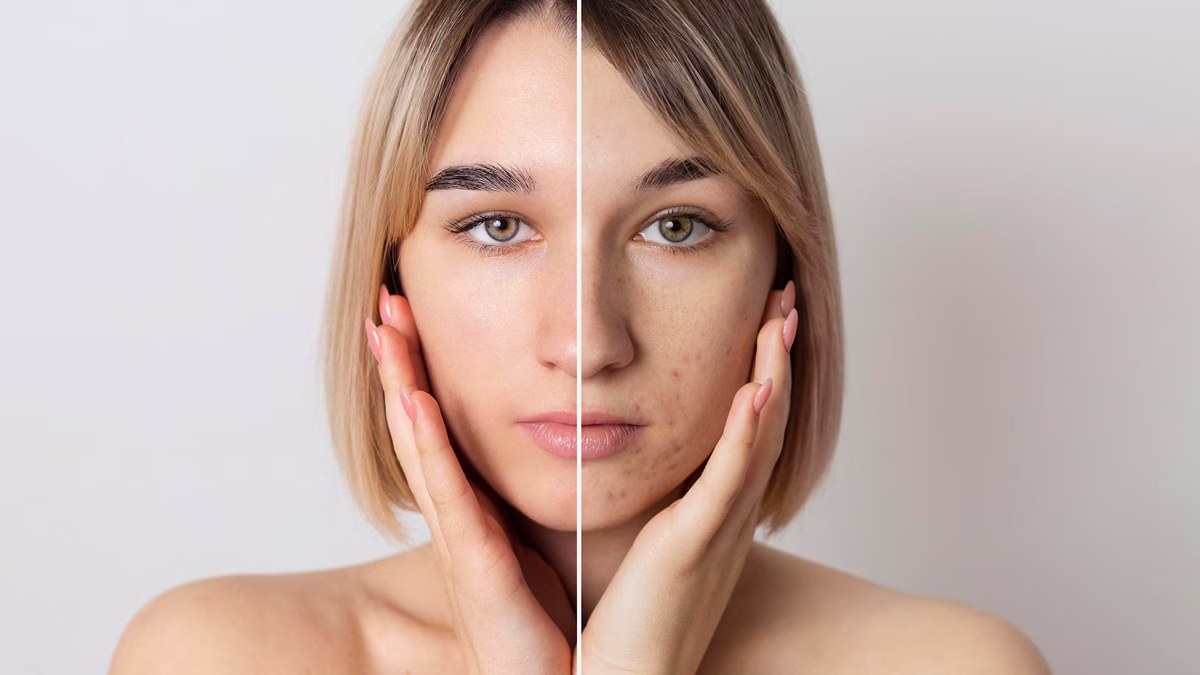
As we age, our skin becomes dull, dry, and more prone to issues like dark spots. This is because of hyperpigmentation, a common condition that occurs due to the excess production of melanin, the pigment responsible for skin colour. Hyperpigmentation makes some areas of the skin appear darker than the others. From hormonal changes to sun damage, several factors can contribute to it.
Table of Content:-
So far, there are many products that claim to reduce hyperpigmentation. Ingredients such as vitamin C and azelaic acid are said to brighten the skin and lessen blemishes. But have you ever heard of arbutin—a skincare ingredient that dermatologists swear by when it comes to reducing the appearance of hyperpigmentation? Read on to find out all about it.
Also Read: Struggling With Unexplained Skin Darkening? Expert Tells 6 Health Reasons You Need to Know
What Is Arbutin?

Arbutin is a naturally occurring compound derived from plants like bearberry, cranberry, and pear. It is widely used in skincare for its skin-brightening properties.
According to Dr Bhawuk Dhir, Consultant Dermatologist, PSRI Hospital, Delhi, arbutin works by regulating the production of melanin. It inhibits the activity of the enzyme tyrosinase, which plays a key role in the production of melanin, the pigment responsible for dark spots and uneven skin tone. "By slowing down melanin synthesis, arbutin helps reduce the appearance of hyperpigmentation, sunspots, and acne scars," shares Dr Dhir, adding that it is considered a gentler alternative to some other skin-lightening agents and is favoured for its ability to improve skin tone without causing irritation or damage to healthy cells.
Skin-Care Benefits Of Using Arbutin
A 2021 study published in the journal Antioxidants suggests that arbutin has its own intrinsic melanin-reducing properties. Melanin is a group of natural pigments responsible for the colour of skin, hair, and eyes in humans and animals. When there is an excess production of melanin, certain areas in the skin may appear darker than the others. Research suggests that arbutin directly inactivates the enzyme tyrosinase after it has been created, hence inhibiting the production of melanin and reducing pigmentation.
Dr Dhir also adds that arbutin is safe for all skin types and tones, including sensitive and darker skin. "Unlike some depigmenting agents that can cause irritation or post-inflammatory hyperpigmentation, arbutin is known for its mildness and low risk of adverse effects," he adds.
The doctor further notes that individuals with darker skin tones, who may be more susceptible to pigmentation issues, can use arbutin without the fear of developing rebound pigmentation or patchy skin lightening.
Arbutin, Hydroquinone, Or Vitamin C: Which Is Better For Dark Spots?

Just like arbutin, hydroquinone and vitamin C are skincare ingredients said to brighten skin and reduce dark spots in people struggling with hyperpigmentation. However, the ingredients are different from each other, particularly in their approach to treating hyperpigmentation.
Dr Dhir shares, “Hydroquinone is often considered the gold standard for treating hyperpigmentation, but it can be quite harsh and is associated with side effects like irritation, dryness, and, with prolonged use, ochronosis (a bluish-black discolouration). On the other hand, arbutin, which is a derivative of hydroquinone, offers similar benefits but in a gentler form, making it a preferred choice for long-term or maintenance use.”
“Vitamin C is another popular ingredient known for its antioxidant and brightening effects. It helps lighten dark spots by neutralising free radicals and promoting collagen synthesis. While vitamin C works well for overall skin radiance and mild pigmentation, arbutin is more targeted for treating deeper pigmentation issues,” he adds.
In many cases, arbutin and vitamin C are used together for a synergistic effect. Both have their unique benefits and can complement each other when used in the right formulation.
Also Read: Melasma Reduction: How To Best Protect Your Skin From The Sun
How To Safely Use Arbutin?

According to Dr Dhir, arbutin is safe for daily use and is often included in both morning and evening skincare routines. “It can be effectively paired with other active ingredients such as niacinamide, hyaluronic acid, and vitamin C for enhanced results,” he says, adding that it also works well with exfoliants like AHAs (alpha hydroxy acids) and BHAs (beta hydroxy acids), though one should be cautious not to over-exfoliate the skin, especially if it’s sensitive.
As per the doctor’s recommendation, retinol can also be used alongside arbutin, but it’s important to introduce actives slowly and watch for signs of irritation. “Using sunscreen during the day is crucial when using pigmentation-targeting ingredients like arbutin, as sun exposure can counteract the benefits,” he emphasises.
Conclusion
When it comes to skincare products and ingredients, there isn’t a one-size-fits-all approach. So is the case with arbutin. While research and experts believe that the ingredient works against hyperpigmentation and dark spots, it may not work for all, or it is likely to take some time for people to see results.
Dr Dhir shares, "The timeline for visible results with arbutin can vary depending on the severity of pigmentation, skin type, and overall skincare routine. Typically, users begin to notice an improvement in dark spots and overall skin tone within 4 to 8 weeks of consistent use. In some cases, it may take up to 12 weeks for more stubborn pigmentation to fade."
He advises people to be patient and consistent, as arbutin works gradually and gently. "For best results, it should be combined with sun protection and a well-balanced skincare regimen tailored to individual skin needs," Dr Dhir concludes.
Also watch this video
How we keep this article up to date:
We work with experts and keep a close eye on the latest in health and wellness. Whenever there is a new research or helpful information, we update our articles with accurate and useful advice.
Current Version